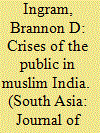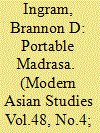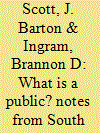|
|
|
Sort Order |
|
|
|
Items / Page
|
|
|
|
|
|
|
| Srl | Item |
| 1 |
ID:
140457


|
|
|
|
|
| Summary/Abstract |
This article argues that Sayyid Ahmad Khan (1817–98) and Ashraf ‘Ali Thanvi (1863–1943) were, respectively, exemplars of what I will call the liberal critique of custom on the one hand, and the Islamic legal critique of custom on the other. I argue that a range of overlapping semantic fields in their Urdu works—‘custom’ (rasm), ‘reform’ (islah), ‘decline’ (zawal, tanazzul) and ‘nation’ or ‘moral community’ (qawm), among others—opens up new lines of inquiry in comparing Aligarh and Deoband, typically treated as incommensurable in their views, as institutions and movements. I suggest, additionally, that ‘the public’ (‘amm) was a shared frame through which they envisioned implementing their respective projects. At the imagined centre of these publics, they located a new sort of Muslim: literate, self-regulating, self-fashioning, guided by rationality (‘aql) and free, above all, of the moral and social entanglements of ‘custom’.
|
|
|
|
|
|
|
|
|
|
|
|
|
|
|
|
| 2 |
ID:
132960


|
|
|
|
|
| Publication |
2014.
|
| Summary/Abstract |
In the first decades of the twentieth century, classically trained Muslim scholars (`ulama) of the influential Deobandi school of North India issued a number of immensely popular, mass-printed 'primers' on Islamic belief and ritual practice. Now ubiquitous in the Islamic bookshops in South Asia and elsewhere, these primers sought to summarize the rudiments of an Islamic education for a nascent lay Muslim reading public. Focusing on three Deobandi `ulama-Ashraf `Ali Thanvi (d. 1943), Mufti Muhammad Kifayatullah (d. 1952), and Muhammad Manzur Nu`mani (d. 1997)-this paper explores how their primers advanced the Deobandi school's well-known critique of popular piety even as they claimed to address Muslims generally, and how their authors negotiated the subtle dynamics of print. Understanding the potentially subversive power of print to open a space for readers to form their own interpretations of minute doctrinal matters and the threat of mass-printed religious texts to their own authority, these `ulama implored readers to refrain from forming their own opinions of the primers' content and to consult the `ulama throughout the reading process. Thus, even as they took advantage of print's possibilities, they remained deeply suspect of its ramifications.
|
|
|
|
|
|
|
|
|
|
|
|
|
|
|
|
| 3 |
ID:
140454


|
|
|
|
|
| Summary/Abstract |
In South Asia, as elsewhere, the category of ‘the public’ has come under increased scholarly and popular scrutiny in recent years. To better understand this current conjuncture, we need a fuller understanding of the specifically South Asian history of the term. Toward this end, our discussion begins by considering more than two decades of scholarship that have worked to excavate this history. We propose that two principal methods or approaches—the genealogical and the typological—have characterised this scholarship. We then suggest, more in the mode of genealogy, that the category of the public has been closely linked to the subcontinental history of political liberalism. Finally, we discuss how the essays collected in this special issue challenge some of liberalism's key presuppositions about the public and its relationship to law and religion.
|
|
|
|
|
|
|
|
|
|
|
|
|
|
|
|
|
|
|
|
|